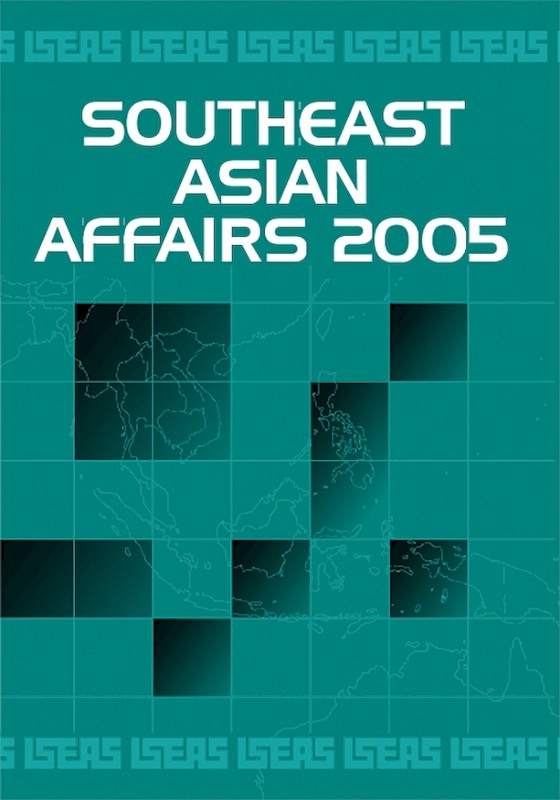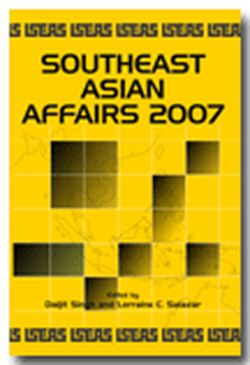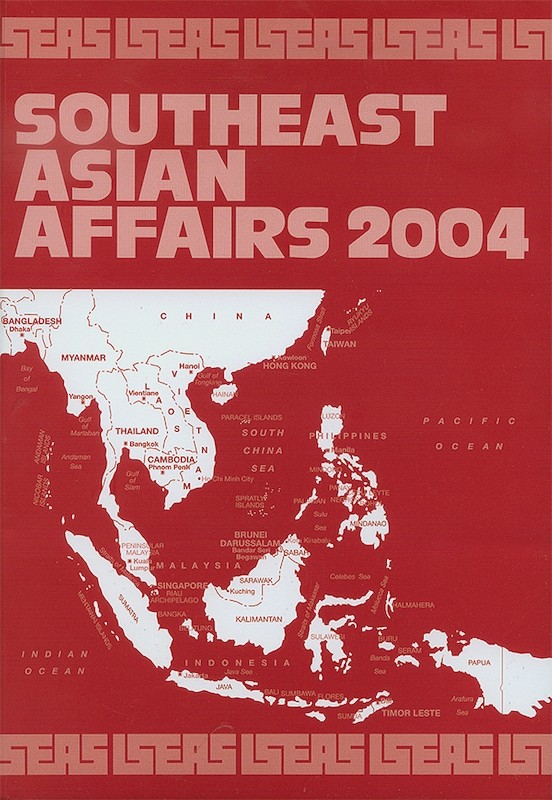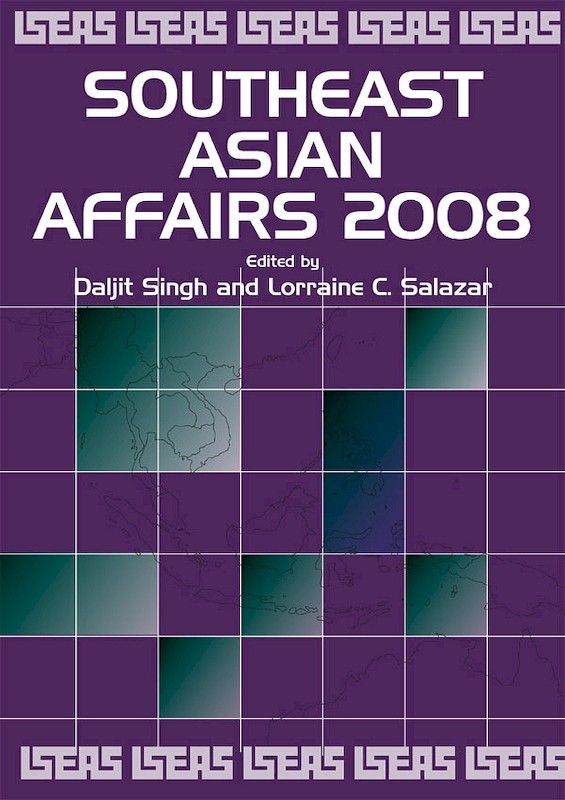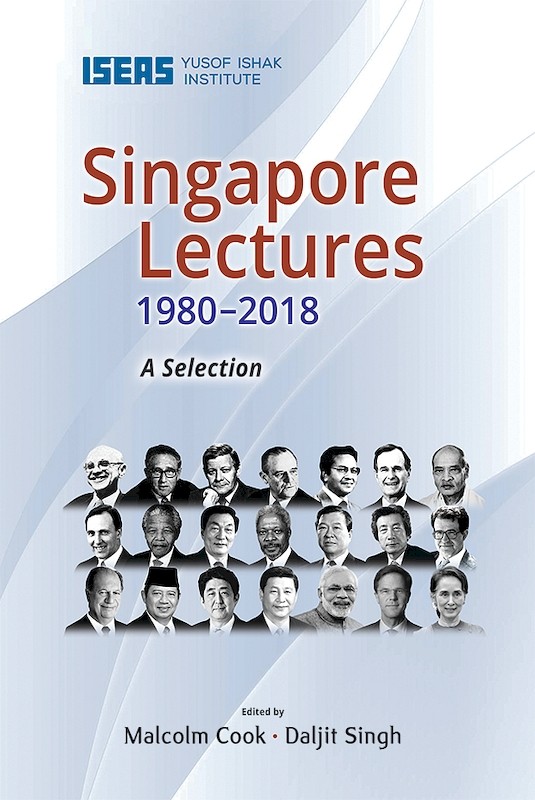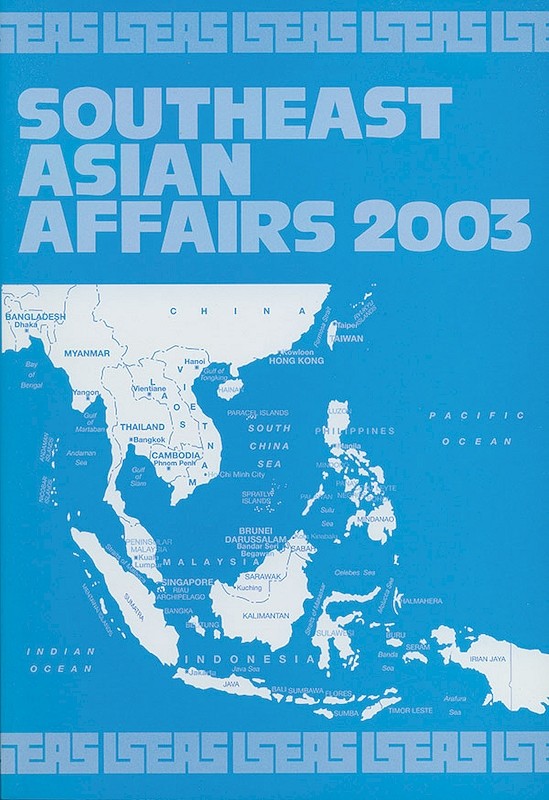Southeast Asian Affairs 2006
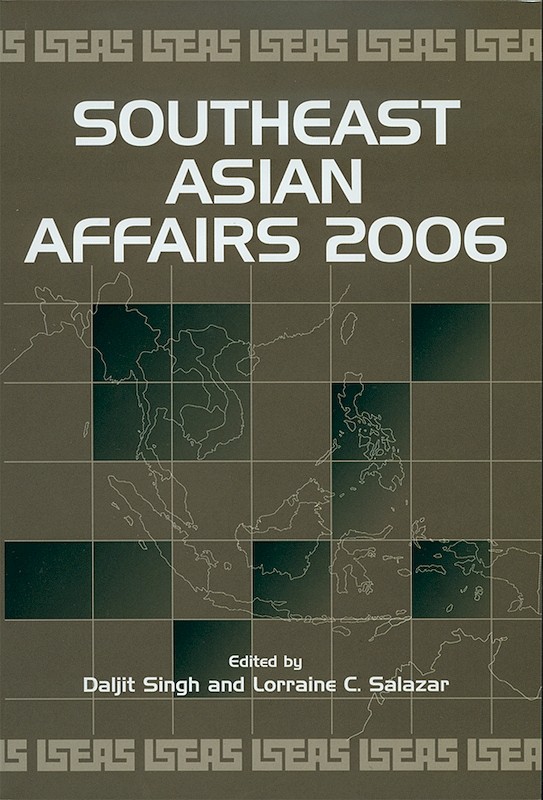
Date of publication:
2006
Number of pages:
365
Code:
SEAA6
About the publication
Southeast Asian Affairs 2006 provides an informed and readable analysis of the events and developments in the region in 2005. The first four articles present the political and economic overview of the region, a nuanced analysis on terrorism, and the role of Japan in East Asian community-building efforts. Eleven country reviews as well as five special theme articles follow, delving into domestic political, economic, security, and social developments during 2005 and their implications for countries in the region and beyond.
Contents
-
Southeast Asian Affairs 2006 Southeast Asian Affairs 2006
-
Preliminary pages
- THE REGION
-
Southeast Asia in 2005: Strength in the Face of Adversity, by Michael Vatikiotis, author see abstractSoutheast Asia in 2005 was overshadowed by the tragic tsunami that struck Thailand and Indonesia's province of Aceh right at the end of 2004. The huge international relief effort, spearheaded by regional neighbours helped to put the worst affected areas back on their feet after so great a loss of life and property. Longer term, it has helped to create a better sense of community in Southeast Asia. Indonesia's remarkable political and economic stability, despite the burden of the tsunami was the highlight throughout the year. The author then reviews main developments in the rest of the region.
-
Southeast Asian Economies: A Year of Exogenous Shocks, by Cassey Lee, Boon-Huat Quah, Marc Foo, authors see abstractA series of exogenous shocks slowed down Southeast Asian economies in 2005. The Tsunami which occurred in late December 2004 resulted in economic losses of more than US$3 billion. In the Aceh alone, more than 130,000 lives perished in the Tsunami. Some 8,000 people died in Thailand as a result of the Tsunami a third of which were tourists. Exogenous economic shocks from abroad also impacted on these and other countries in the region during the year. Rising oil prices fueled stagflationary fears not seen since the oil crises in the 1970s. Towards the end of 2005, the threat of a pandemic avian flu in the region underscored the continuing vulnerability of the region to further exogenous shocks.
-
Terrorism: Evolving Regional Alliances and State Failure in Mindanao, by Kit Collier, author see abstractDiscussion of regional terrorism, punctuated by Octobers new attacks in Bali, remained dominated in 2005 by three interwoven themes: that the problem is an Indonesian one, embodied in a single cohesive organisation, Jemaah Islamiyah, which acts as an arm of al-Qaeda. Dissident country specialists questioned the legitimacy of terrorism studies as a field of inquiry, but more careful research exposed shifting and contingent alliances between autonomous jihadi factions, increasingly dependent on state failure in the southern Philippines to find sanctuary from law enforcement. The challenge ahead, highlighted by creeping U.S. military intervention in Mindanao, is to understand such alliances between foreign and local jihadis deeply enough to avoid catalyzing them further. Approaches that focus on Indonesia or JI alone, assume a world of clearly bounded terrorist organisations, or attribute terrorism to undifferentiated root causes all fail to confront the reality of an emerging generation of Mindanao veterans who do not answer to JI, but will pose a danger for years to come.
-
Japan in an Insecure East Asia: Redefining Its Role in East Asian Community-Building, by Tsutomu Kikuchi, author see abstractAlthough Japan, as a global nation, has huge stakes in strengthening global governance institutions, East Asia is becoming a more important region for Japans peace and prosperity. An East Asian Community now under construction is crucial for Japan in this regard. If it succeeds in developing a community, Japan could become a 21st century economic phoenix. However, there are huge differences and conflicts among the countries of the region over how to organize international relations, in spite of the pressing need to develop renovated norms and principles to promote much deeper collaboration. With the increased sense of insecurity and uncertainty of the future that are being caused by the great transformation of regional economic, political and security landscape, almost all countries are adopting a variety of strategies to protect their interests, further complicating the cause of region-making. Japan must face and respond to the challenges, even if this demands a painful rethinking of Japans past and future role in the region.
- BRUNEI DARUSSALAM
-
Brunei Darussalam: Consolidating the Polity, by Pushpa Thambipillai, author see abstract2005 was an important year for consolidating the political and economic policies and the long-term strategies for Brunei Darussalam. A new cabinet was appointed with a five-year term of office, unlike previous appointments where there was no time limit. While the high price of oil ensured a healthy national income, the search for diversification away from dependence on hydrocarbon continued. Joint foreign investments were expected to expand the industrial sector and increase employment potentials in the coming few years. Bruneis close bilateral and regional relations emphasize on promoting in political, security and economic interests.
- CAMBODIA
-
Cambodia: Positioning for 2008, by Verghese Mathews, author see abstractThis article reviews the major events in Cambodia in 2005. It starts by looking into the countrys economic performance and assesses the role and the extent of the countrys dependence on donor assistance. Next, three main political developments are examined: the progress of the Khmer Rouge Tribunal, the political acrobatics and the role played by key political players, and the arrest of four activists. The article concludes by exploring the continuing challenges that Cambodia faces, especially the need to strengthen democratic institutions, to ensure that good governance is firmly rooted in the country, to curb corruption, and dismantle the deeply entrenched patronage system.
- INDONESIA
-
Indonesia: Accomplishments Amidst Challenges, by Irman G Lanti, author see abstractThis article surveys the development in Indonesian politics, security, economics, and foreign policy in 2005. It highlights the extent of devastation caused by the tsunami in Aceh and the challenges facing the rehabilitation and reconstruction efforts. It points out that despite the tremendous human suffering the tsunami caused, it opened up space for a peaceful resolution of the decades-long conflict in the province, involving the rebel GAM and the Indonesian central authority. The article also takes note of the direct election of regional leaders that took place in 2005 as an important step towards consolidation of democracy in the country. On the security front, the article discusses the successes in the fight against terrorism in Indonesia, and the steps taken by the government to curb the growth of a perverted ideology that leads to terrorist activities. The article then goes on to argue that there was a return of a more activist foreign policy during the year. Yet, despite all the progress that Indonesia achieved during the year, corruption and governance still remained pressing problems. Indonesia will also likely face economic challenges as the country has to adjust to a volatile oil market and a stiffer competitive environment.
-
Indonesian Military Reform: More Than a Human Rights Issue, by John B Haseman, author see abstractThe Indonesian military has always been the most powerful element in Indonesian society. During the Suharto years it was the primary institution for ensuring the security of the regime. Now that Indonesia has become a democracy the military is faced with the challenge of becoming a viable aspect of democratic society. There are many demands for reform to change the military into a truly democratic institution. It has accomplished many important changes but still has challenges to overcome before reaching the status that its new government and its populace desire. Changing the military's institutional mind-set is perhaps the most difficult of these challenges, but progress in reform has accomplished many objectives, and progress under an able and reform-minded president appears to be well underway.
- LAOS
-
Laos: The State of the State, by Kyaw Yin Hlaing, author see abstractSince undertaking economic reforms in 1986, the Laos Peoples Revolutionary Party (LPRP) has become less communistic and repressive. Sustained economic growth indicate that despite difficulties in administrative and economic reforms, the LPRP governments technical, institutional and administrative capacities are improving. Even though there exist grievances among the general public, the political situation is very stable. There is no threat of social protests interrupting the governments reform programs. The governments main objective is to graduate from being one of the poorest countries in the world by 2020. The big question is whether the Laotian state has the capacity to achieve these goals. More drastic reforms are required to improve its current situation.
- MALAYSIA
-
Malaysia: The Challenge of Money Politics and Religious Activism, by K S Nathan, author see abstractPrime Minister Abdullah Badawi began his fifteenth month in office as leader of this multi-ethnic nation of 26 million people. Corruption, cronyism, and nepotism afflicting largely Malay enterprises continued to be big challenges despite the Premiers best efforts to stamp them out. Religious intolerance within and outside the official bureaucracy posed an additional challenge to Abdullahs Islam Hadhari project. In the economic sphere, Malaysia has done reasonably well. Externally, Malaysia can take credit for boosting ASEANs relevance, inaugurating the East Asia Summit, and positively engaging major regional and global players towards the development, security, and prosperity of the Asia-Pacific region.
-
Mahathir as Muslim Leader, by Ooi Kee Beng, author see abstractMahathirs long political career was marked by a fervent push for economic progress, not merely for Malaysia, but for Malays in particular. His book, The Malay Dilemma, articulated the dire position of the Malays in the immediate post-colonial period. On becoming Prime Minister in 1981, he implemented policies to alter work ethics, challenged notions of western superiority and scolded Malays for their perceived inability to modernize. Another process he encouraged was Islamization. In later years, Mahathir has taken on new prominence in the global context as Muslim leader. His fundamentalist understanding is that Islam is essentially a knowledge seeking teaching that had lost its way. This evolved view maintains his distrust of the west, and continues to involve a scolding of his new patients Muslims.
- MYANMAR
-
Myanmar: Challenges Galore but Opposition Failed to Score, by Tin Maung Maung Than, author see abstractThe main events that characterized Myanmars political scene in 2005 were the military governments highlighting of its National Convention (NC) as a showcase for political progress and the crackdown of political activists from the Shan ethnic group. The legitimacy of the NC was still not accepted by the political opposition and the US-led Western governments while the crackdown attracted a fresh round of condemnations by the advocates of human rights, political opposition from within and without the country and Western governments. In fact, the issue of lack of progress in instituting political reforms towards democratic rule had become the bone of contention in ASEANs relations with its dialogue partners and even within ASEAN itself. There was a significant increase in attempts by the international community to press for changes in the regimes conduct. Nevertheless, the opposition failed to score any success in its campaign against the military regime. Meanwhile, on the economic front, the government continued its claim of double-digit GDP (gross domestic product) growth as in the last few years, despite cost-push inflationary pressures and further deterioration in the free market exchange rate of the local currency to the US dollar. The governments claim of a high economic growth rate was disputed by outside observers such as the Economist Intelligence Unit and the Asian Development Bank.
-
Myanmars Human and Economic Crisis and Its Regional Implications, by Bruce Matthews, author see abstractMyanmar (formerly Burma) continues a fifth decade under direct military rule. This essay argues that there are gathering and serious geopolitical, not just domestic consequences because of this. It first reviews the internal situation based on fieldwork conducted in June, 2005, and taking into consideration events to the present. These include the November 2005 shift of the administrative capital to Naypyidaw (Pyinmana); the structure of the State Peace and Development Council and the consequences of former Secretary 1 Khin Nyunts removal in October 2004; the on-going National Convention and continuing ethnic challenges; the place of Daw Aung San Suu Kyi and the National League for Democracy in society; various economic, educational and health care issues; and the on-going role of the Tatmadaw (armed forces) in government. Second, the essay examines the regional and international implications of Myanmars continuing authoritarian polity and its failure to adequately address key matters of human security. Issues discussed focus on the continuing displacement of thousands of dispirited ethnic peoples, especially in the Arakan and the Shan and Karen states bordering Bangladesh and Thailand respectively; unrelenting challenges associated with heroin production and other narcotics; ASEAN (particularly the August 2005 relinquishment of Myanmars imminent chairmanship of ASEAN); and UN perspectives and possible strategies concerning Myanmar. The essay ends with reflections on what strategies (e.g., constructive engagement) might best assist Myanmar in its long struggle to emerge as a fully modern Southeast Asian state.
- THE PHILIPPINES
-
The Philippines: Crisis, Controversies, and Economic Resilience, by Lorraine Carlos Salazar, author see abstractFor a country known for both its strong commitment to democracy and its weak political institutions, the year 2005 was full of intrigues and challenges for the Philippines. In July, the Arroyo administration almost collapsed amidst rumours of coups, political controversies, and another people power movement, sidelining efforts towards economic reform. Yet, despite this crisis and ensuing policy failure, the economy performed well, displaying unexpected resilience. This article examines the events of 2005 in three parts. The countrys main political events are first examined, before proceeding to analyse the state of the economy. The final section concludes the review by reflecting on the countrys economic and political prospects in the short term.
-
The Abu Sayyaf Group: From Mere Banditry to Genuine Terrorism, by Rommel C Banlaoi, author see abstractRommel Banlaoi discusses the origins of the Abu Sayyaf Group (ASG), its organisational structure and leadership dynamics, and its capabilities. Recently the ASG has transformed itself from banditry into a genuine terrorist organisation that has perpetrated a number of bombings in 2005. It remains the most lethal armed Muslim group in the Philippines that has developed capabilities for maritime terrorist attacks and suicide missions.
- SINGAPORE
-
Singapore: Globalizing on Its Own Terms, by Terence Chong, author see abstractThis chapter surveys the social, economic and political landscape of Singapore to identify and analyse the events that have shaped 2005. From the 2005 Budget, the government's decision over the casinos, the white elephants of Bungkok, to the Elected Presidency, this chapter narrates Singapore's challenges as nation-state and global city. This chapter shows how the constant oscillation between being globally open and locally particular has given rise to the Singapore paradox. The city-state enjoys its status as one of the most globalised countries in the world in terms of migration, global finance and telecommunications, and yet regularly garners criticism from international human rights institutions for its insistence on practicing its own brand of politics, whereby certain civil liberties are curtailed in view of local multiethnic and multireligious realities. This chapter concludes that the Singapore practices selective globalisation, itself an expression of the need to remain globally connected for national survival, and the desire to retain certain notions of tradition and conservatism that protect specific interests.
- THAILAND
-
Thaksins Political Zenith and Nadir, by Thitinan Pongsudhirak, author see abstractThis chapter highlights the contours of Prime Minister Thaksin Shinawatras roller-coaster time in power from his landslide re-election in the February 2005 general election to his forced dissolution of the lower house a year later, underpinned by a street-led protest movement that threatened to dislodge his rule. It briefly probes internal dynamics of the ruling Thai Rak Thai party, censure politics, cabinet reshuffle, the southern violence, and the explosive Shin Corp scandal that galvanised street demonstrations against everything Thaksin stood for. The chapter also covers the prolonged political standoff between the incumbent prime minister and his political opponents that led to a new general election and the prospect of a post-Thaksin Thailand. It concludes by calling for effective constitutional provisions and democratic institutions to prevent a future crisis as witnessed in 2006, ultimately reinforced by bridging the urban-rural and regional fissures that surfaced in this extraordinary year.
-
Thailands Independent Agencies under Thaksin: Relentless Gridlock and Uncertainty, by Alex M Mutebi, author see abstractDuring Prime Minister Thaksins tenure in office, the various independent institutions mandated by the 1997 Constitution have struggled to establish their authority and credibility. This paper examines political interference in the establishment of four of Thailands independent agencies and shows how it continues to be a barrier to the countrys democratic consolidation. Political interference does not only render ineffective the system of checks and balances between the legislative, executive, and judicial branches of government, but also gives undue influence to vested interests both within and outside government.
- TIMOR LESTE
-
Timor Leste: On a Path of Authoritarianism?, by Jacqueline A. Siapno, author see abstractThis article reviews the developments in East Timor in 2005. Siapno argues that a few years into independence, the government is tredding towards the depressing path of authoritarianism as it attempts to introduce an anti-defamation law and moves to foreclose public space for democratic discussion. The article looks at issues in East Timors foreign relations, in particular with its two immediate neighbours, Indonesia and Australia. Next, the article explores developments on poverty reduction and increasing human security. Finally, the article examines the in-between spaces in the politics of culture, memory, and identity, and the resilience of the East Timorese.
- VIETNAM
-
Vietnam: Laying the Path for the 10th National Congress, by Danny Wong Tze Ken, author see abstractThis article focuses on the actions and responses of the ruling Communist Party of Vietnam (VCP) in 2005 as it pursues its reform programme in the run up to the 10th National Congress. The threats posed by endemic corruption, questions relating to religious freedom, and the governments handling of political dissidents continued to dominate much of domestic politics. The pace of state-owned enterprises reform and Vietnams pending entry into the World Trade Organisation were the two central economic issues. Finally, the article considers Vietnams successes in its foreign relations and raises questions on how these could be translated by the VCP government in strengthening its position in domestic politics.

